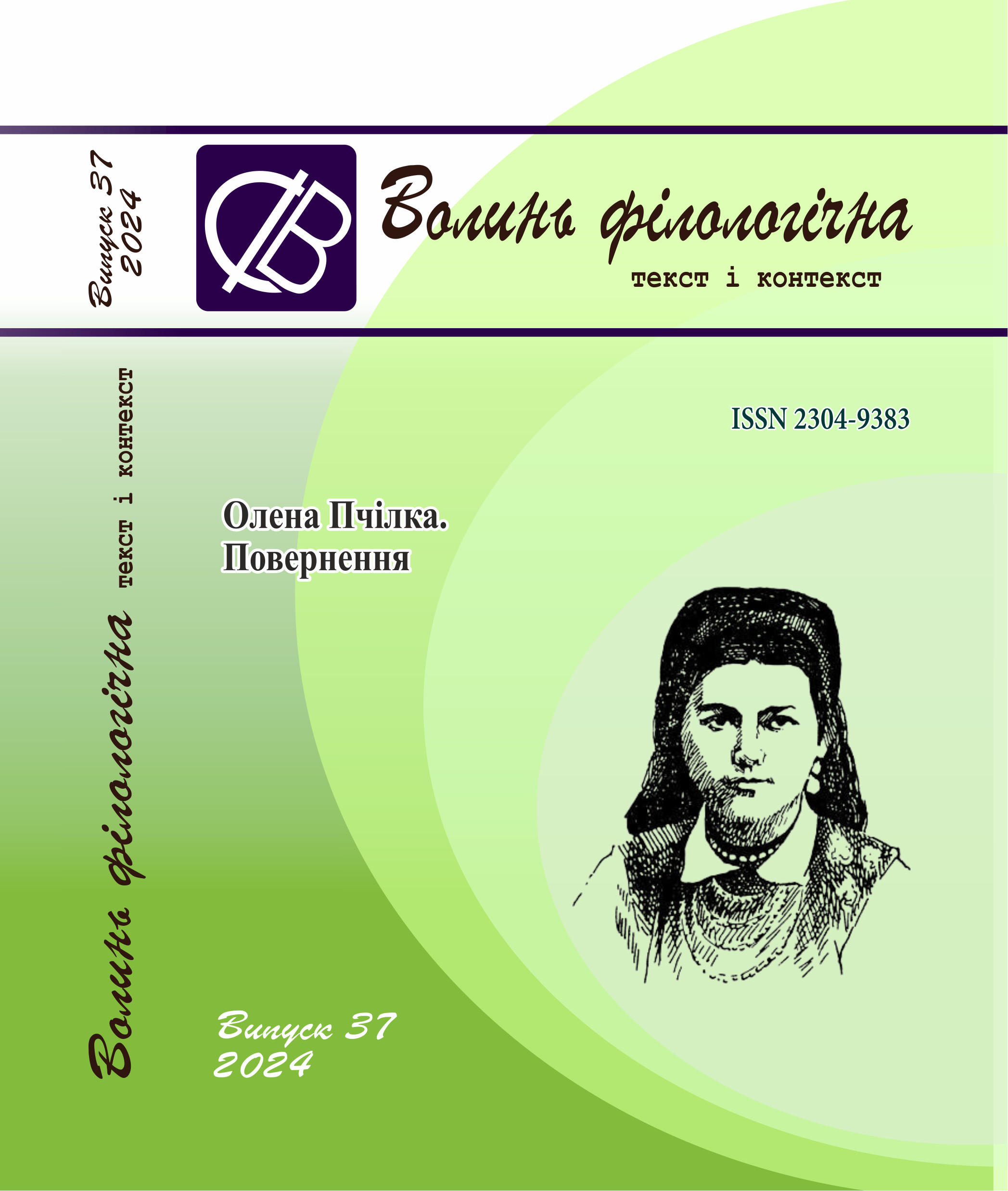(Non)stereotypes of love: "The World Thing" by Olena Pchilka in the 21st century
DOI:
https://doi.org/10.29038/2304-9383.2024-37.fedAbstract
The article presents the peculiarities of constructing the image of love in Olena Pchilka's comedy “The World Thing” given the modernization of Ukrainian society at the end of the 19th century. Poetological, gender, and feminist-critical methods and a modelling approach were used to implement the research. Intelligence about a woman's place in society and marriage at the end of the 19th and the beginning of the 20th century proved to be helpful for the identification of artistic models of the image of love since at that time the vector of a girl's upbringing was strictly limited to her future social roles inherent in her gender.
It was established that three models of the image of love are implemented in the play – traditional mesalliance, romanticized adultery, and modern marriage for love. The system of characters is quite heterogeneous since the author depicts protagonists with opposite views on relationships and marriage. The views traditional at that time are embodied in the more mature characters of Krasovska, Marya, Zaychevska, Pavluschenko, and Bogush. Marriage as a business contract and a woman as a commodity are common characteristics of “love” relationships rooted in the thinking of the older generation. While young people prefer marriage over love, this is exactly the position advocated by Holub and Sasha, in whom Olena Pchilka embodies the features of the modernized future. The basis of the first model of the image of love is the unrealized marriage of Pavlushchenko with Sasha, the motives of which lie in the preservation of the Krasovska family estate. Yakiv Stepanovych is a typical representative of a patriarchal society that considers his wife as property. Using a comic effect, the playwright portrays Pavluschenko's true character – an “educated” character with conservative views on marriage, from time to time diversifying the husband's speech with expressive mistakes and rude addresses to his chosen one. Romanticized adultery is the second artistic model of the image of love, which is realized through the relationship of Alexandra and Victor, in the image of which the features of a typical hero-lover, a seducer, with distinct features of a trickster, can be traced. The “innovative” views of Tamalii debunk the permanence of the institution of marriage, and provoke non-acceptance on the part of Alexandra, due to which their relationship is short-lived. The cornerstone of the third is the background and at the same time cross-cutting relations between Sasha and Golub, which represent a shift in emphasis in the value system – the leveling of the material and the elevation of the spiritual. The feeling of needing each other occurs only after a long separation and is accompanied by certain deviations in usual behavior. A particularly expressive artistic technique in the play is the identification of a wedding with death – the parallelism and representation of the ritual as a transition reinforce the absurdity of the outdated traditional arranged marriage, thus emphasizing the need to rethink the value system. We see the prospects of continuing studies of Olena Pchilka's work, in particular dramaturgy, in the possibility of including it in the context of early Ukrainian feminism.
References
Кісь, О. (1999). Особливості соціалізації дівчаток в українській сім’ї ХІХ – початку ХХ ст. Етнічна історія народів Европи. Традиційна етнічна культура слов’ян. Збірник наукових праць. Київ, 49–55.
Кісь, О. (Ред.). (2015) Українські жінки в горнилі модернізації. Харків: Клуб сімейного дозвілля.
Колкутіна, В. (2010). Олена Пчілка в рецепція Дмитра Донцова. Рідний край: Літературознавство, 1, 105–110.
Левчук, Т. (2019). Олена Пчілка про моду і вроду. Волинь філологічна: текст і контекст, 28, 119–147. URL: http://surl.li/gpmnbx
Михайлюк, М. (2024). На полтавській сцені вперше в Україні покажуть виставу «Світова річ» від Народного театру «На Павленках». URL: http://surl.li/uslhm
Пчілка, Олена (2011). Автобіографія. Мікула О. Творчість Олени Пчілки і фольклор. Ужгород: Гражда, 215–274.
Пчілка, Олена (1988). Світова річ. Твори. Упорядник Н. Вишневська. Київ: Дніпро, 387–496.
Смоляр, Л. (1998). Минуле заради майбутнього. Жіночий рух Наддніпрянської України ІІ пол. ХІХ – поч. ХХ ст. Сторінки історії. Одеса.
Тхорук, Р. (2010). Комедія Олени Пчілки «Світова річ»: тематично-структурні зміщення. Леся Українка і сучасність: зб. наук. праць. Луцьк, т. 6, 389–401.
Чернишов, А. (1969). Для рідного театру. Прапор, 11, 92–95.

